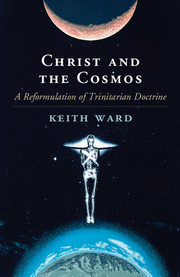Book contents
- Frontmatter
- Contents
- Preface
- Acknowledgements
- PART I THE THREEFOLD NATURE OF THE DIVINE BEING
- PART II THE BIBLICAL SOURCES OF TRINITARIAN THOUGHT
- 6 Three Centres of Consciousness?
- 7 The Synoptic Gospels
- 8 John's Gospel
- 9 The Trinity in the Epistles
- 10 The Idea of Incarnation
- PART III THE TRINITY, IMMANENT AND ECONOMIC
- PART IV THE SOCIAL TRINITY
- PART V THE COSMIC TRINITY
- Bibliography
- Subject Index
- Name Index
9 - The Trinity in the Epistles
from PART II - THE BIBLICAL SOURCES OF TRINITARIAN THOUGHT
Published online by Cambridge University Press: 05 September 2015
- Frontmatter
- Contents
- Preface
- Acknowledgements
- PART I THE THREEFOLD NATURE OF THE DIVINE BEING
- PART II THE BIBLICAL SOURCES OF TRINITARIAN THOUGHT
- 6 Three Centres of Consciousness?
- 7 The Synoptic Gospels
- 8 John's Gospel
- 9 The Trinity in the Epistles
- 10 The Idea of Incarnation
- PART III THE TRINITY, IMMANENT AND ECONOMIC
- PART IV THE SOCIAL TRINITY
- PART V THE COSMIC TRINITY
- Bibliography
- Subject Index
- Name Index
Summary
The depiction of God as threefold is clearly to be found in many of the Letters included in the New Testament. Much of this literature is earlier than the Gospels, and so it expresses thoughts that were current in some of the earliest strands of Christian belief, and probably taken for granted in the Gospels. One strand that is very clear in Paul's Letters, and not explicitly emphasised in the same way in the Gospels, is the vital importance of the experience of the Spirit in the Church. The Gospels on the whole concentrate on the life and teachings of Jesus, though of course they do so in the light of a belief in the resurrection. The passion of Jesus is of supreme importance in the Gospels, but not much is said about its atoning significance in the lives of believers.
In considering Paul's views, I shall take the Letters to the Galatians, Romans, and Corinthians as largely if not wholly written by Paul. What is most significant about them is their very strong emphasis on the presence and work of the Holy Spirit as a transforming power in the lives of believers: ‘If we live by the Spirit, let us also be guided by the Spirit’ (Galatians 5, 25). For Paul, Christian faith begins with a personal experience of the Spirit as a power that liberates from ‘the Law’. Whereas traditionally Jews have lived by obedience to Torah, the Law, now disciples of Jesus must live by ‘the law of the Spirit of life’, which ‘in Christ Jesus has set you free from the law of sin and of death’ (Romans 8, 2). Paul even lists the virtues, the ‘fruit’, which the Spirit produces: ‘love, joy, peace, patience, kindness, generosity, faithfulness, gentleness, and self-control’ (Galatians 5, 22–23). In this sense Paul's Gospel is experiential, founded on a new experience of liberation from rules and freedom to enjoy a new quality of life.
This new experience, however, is for Paul essentially connected with the person of Jesus, and in particular with Jesus’ death and resurrection. ‘A person is justified not by the works of the Law but through faith in Jesus Christ’ (Galatians 2, 16).
- Type
- Chapter
- Information
- Christ and the CosmosA Reformulation of Trinitarian Doctrine, pp. 66 - 72Publisher: Cambridge University PressPrint publication year: 2015



